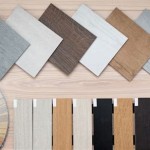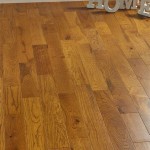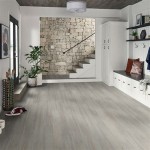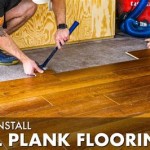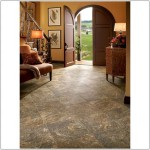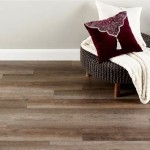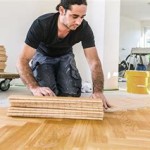Is Vinyl Plank Flooring Safe For Stairs In Georgia, USA?
Vinyl plank flooring has gained considerable popularity as a versatile and cost-effective flooring option for residential and commercial properties. Its durability, water resistance, and ease of installation have made it a favored alternative to traditional materials like hardwood and tile. However, the suitability and safety of using vinyl plank flooring on stairs, particularly in a climate like Georgia's, raise important considerations. This article delves into the factors influencing the safety of vinyl plank flooring on stairs in Georgia, addressing both the advantages and potential risks associated with this application.
To accurately assess the safety of vinyl plank flooring on stairs in Georgia, several factors must be taken into account. These include the specific type of vinyl plank used, the installation method, the environmental conditions prevalent in Georgia, and the adherence to relevant building codes and safety standards.
Understanding Vinyl Plank Flooring
Vinyl plank flooring is a manufactured product composed of multiple layers, typically including a wear layer, a decorative layer, and a core layer. The wear layer, usually made of polyurethane or a similar protective coating, determines the flooring's resistance to scratches, scuffs, and stains. The decorative layer provides the aesthetic appeal, mimicking the appearance of wood, stone, or tile. The core layer provides stability and structural integrity. There are two main types of vinyl plank flooring: Luxury Vinyl Plank (LVP) and Waterproof Vinyl Plank (WVP). Both offer advantages in terms of durability and water resistance, but their construction and performance characteristics differ slightly.
Luxury Vinyl Plank (LVP) generally features a thicker wear layer and a more robust core compared to standard vinyl plank flooring. This increased thickness enhances its durability and resistance to wear and tear, making it a suitable option for high-traffic areas, including stairs. Waterproof Vinyl Plank (WVP) is specifically engineered to withstand moisture exposure, making it an excellent choice for environments prone to spills or high humidity. Its construction often includes a waterproof core made of materials like SPC (Stone Plastic Composite) or WPC (Wood Plastic Composite), preventing water from penetrating the flooring.
The choice between LVP and WVP for stair applications in Georgia depends on the specific environment and anticipated usage. In areas with high humidity or frequent exposure to moisture, WVP may be the preferred option. However, LVP can also provide adequate performance in drier environments if properly installed and maintained.
The safety of vinyl plank flooring on stairs is intrinsically linked to its slip resistance. The surface texture and finish of the vinyl plank play a critical role in determining its slipperiness. Smooth, glossy surfaces tend to be more slippery than textured or matte finishes. Therefore, selecting vinyl plank with a textured surface or a slip-resistant coating is crucial for stair applications. Furthermore, enhancing the grip with stair treads or non-slip strips is highly recommended to minimize the risk of falls.
Georgia's Climate and its Impact
Georgia's climate is characterized by hot, humid summers and mild winters. The high humidity levels, particularly during the summer months, can affect the performance of certain flooring materials. Excessive moisture can lead to expansion and contraction, potentially causing warping or buckling of the vinyl plank flooring. Additionally, the fluctuating temperatures can contribute to the adhesive's degradation, compromising the bond between the flooring and the stair substrate.
Therefore, it is essential to choose vinyl plank flooring that is specifically designed to withstand humidity and temperature variations. WVP, with its waterproof core, is particularly well-suited for Georgia's climate. Additionally, utilizing a high-quality adhesive that is resistant to moisture and temperature fluctuations is crucial for ensuring long-term stability and preventing the flooring from detaching from the stairs.
Proper ventilation and climate control can also help mitigate the effects of Georgia's climate on vinyl plank flooring. Maintaining a consistent temperature and humidity level within the building can minimize expansion and contraction, prolonging the flooring's lifespan and enhancing its safety. Regular inspection and maintenance are also essential for identifying and addressing any potential issues, such as loose planks or adhesive failure, before they escalate into safety hazards.
The installation process is paramount to the safety and longevity of vinyl plank flooring on stairs. A professional installation ensures that the flooring is properly adhered to the stair substrate, minimizing the risk of slippage or detachment. The substrate must be clean, dry, and level to provide a solid foundation for the vinyl plank. Any imperfections in the substrate can compromise the flooring's stability and create uneven surfaces, increasing the risk of falls.
Properly securing the vinyl plank to the stair nose is particularly critical. The stair nose, the overhanging edge of the stair tread, is a high-traffic area and subject to considerable stress. The flooring must be securely fastened to the stair nose to prevent it from breaking or detaching, which could create a tripping hazard. Specialized stair treads designed for vinyl plank flooring are available and offer enhanced grip and durability.
Key Safety Considerations and Mitigating Risks
Several key safety considerations must be addressed to ensure the safe use of vinyl plank flooring on stairs in Georgia. These include slip resistance, proper installation, and adherence to building codes.
Slip Resistance: As previously mentioned, slip resistance is a critical factor in stair safety. Selecting vinyl plank flooring with a textured surface or slip-resistant coating is essential. Additionally, incorporating stair treads or non-slip strips can significantly enhance grip and minimize the risk of falls. The Americans with Disabilities Act (ADA) provides guidelines for slip resistance on walking surfaces, including stairs, and these guidelines should be consulted when selecting flooring for commercial or public spaces.
Proper Installation: A professional installation is crucial for ensuring the flooring's stability and preventing accidents. The installer should be experienced in working with vinyl plank flooring and have a thorough understanding of stair construction. They should properly prepare the substrate, use a high-quality adhesive, and securely fasten the flooring to the stair nose. Regular inspections should be conducted to identify and address any loose planks or adhesive failure promptly.
Adherence to Building Codes: Building codes and safety standards in Georgia may specify requirements for stair construction and flooring materials. These codes are designed to ensure the safety of building occupants and prevent accidents. It is essential to consult with local building officials or a qualified contractor to ensure that the vinyl plank flooring installation complies with all applicable codes and regulations.
Beyond these key considerations, ongoing maintenance is important to keeping stairs safe. Regular cleaning and maintenance are essential for preserving the slip resistance and extending the lifespan of vinyl plank flooring on stairs. Spills should be cleaned up immediately to prevent slips and falls. Regular sweeping or vacuuming can remove dirt and debris that could compromise the flooring's grip. Periodic waxing or polishing can help maintain the flooring's appearance and protect its surface from scratches and scuffs.
The selection of appropriate stair treads or non-slip strips can significantly enhance the safety of vinyl plank flooring on stairs. These accessories provide additional grip and prevent slips, particularly in wet or humid conditions. Stair treads are typically made of rubber, vinyl, or carpet and are available in various sizes and styles. Non-slip strips are adhesive-backed and can be easily applied to the stair treads. When selecting stair treads or non-slip strips, it is important to choose products that are specifically designed for use with vinyl plank flooring and that comply with relevant safety standards.
Adequate lighting is crucial for stair safety. Poor lighting can obscure hazards and increase the risk of falls. Installing sufficient lighting fixtures to illuminate the stairs can significantly improve visibility and prevent accidents. Consider installing lights at the top and bottom of the stairs, as well as along the stairwell. Motion-sensor lights can also be a valuable addition, providing illumination when needed and conserving energy when the stairs are not in use.
Handrails are an essential safety feature for stairs. Handrails provide support and stability, reducing the risk of falls. Building codes typically require handrails on stairs with a certain number of risers. The handrails should be securely mounted and easily accessible. The height and placement of the handrails should comply with accessibility guidelines to ensure that they can be used by people of all ages and abilities.
In conclusion, the safety of vinyl plank flooring on stairs in Georgia depends on a combination of factors, including the type of vinyl plank used, the installation method, the environmental conditions, and the adherence to safety standards. While vinyl plank flooring offers several advantages, such as durability and water resistance, it is essential to carefully consider the potential risks and take appropriate measures to mitigate them. By selecting the right type of vinyl plank, ensuring a professional installation, and implementing safety features such as stair treads, non-slip strips, and adequate lighting, it is possible to create a safe and attractive staircase with vinyl plank flooring in Georgia.

Us Vinyl Floor Bending Georgia Custom Bent Luxury Plank Stair Treads Nosings Md

Us Vinyl Floor Bending Georgia Custom Bent Luxury Plank Stair Treads Nosings Md

Us Vinyl Floor Bending Georgia Custom Bent Luxury Plank Stair Treads Nosings Md

Lvp Stair Treads Ideas

Which Flooring Is Best For Stairs

Luxury Vinyl Plank Flooring Stair Treads

Staircase Remodeling Eco Flooring Usa

Luxury Vinyl Plank Stair Treads Pros And Cons

Floorte Vinyl Flooring With Shaw Floors Southern Hospitality

Luxury Vinyl Flooring Planks Msi Surfaces
See Also

